No Relaxation of Measures at Least Until 15 February, JL Says
ZAGREB, 17 January, 2021 - The current epidemiological measures will be extended at least by mid-February, according to what advisers have been suggesting to the national COVID-19 crisis management team, Jutarnji List daily said on Sunday.
It is even possible the measures will be extended by March as nothing can guarantee that the situation will not deteriorate even with the existing restrictions.
They underscore that it must be seen what will happen when classes for lower grades of elementary school and for high school seniors start and how the recent holiday gatherings and holidays spent outside one's place of residence will affect the spread of the epidemic.
Since Croatia has been registering a drop in the number of infected people among those tested, as well as a drop in the number of hospitalised patients, there has been an increasing number of appeals for relaxing the measures. Many hope that after 31 January, the date by which the current measures are in force, outdoor cafes, gyms and fitness centres could reopen.
The head of Istria County's COVID-19 crisis management team, Dino Kozlevac, has already announced he "will discuss the matter with the national team", without whose permission that cannot be done as local measures can only be stricter than national ones.
However, it is certain that there will be no relaxation of measures until the end of January. Also, it is too soon to predict what could happen in ten days, and current temperatures are not helping. Experts explain that even if bar and restaurant terraces were to open, heaters would have to be turned on, around which a large number of people would gather, Jutarnji List said.
Almost 46,000 Croats Vaccinated, Second Shot to be Given as of 18 Jan
ZAGREB, 17 January, 2021 - By mid-January 45,906 people in Croatia have received the first shot of the Pfizer/BioNTech COVID-19 vaccine and the second shot will be administered as of 18 January, the Croatian Institute of Public Health said on Sunday.
The second dose will be given to people who have been vaccinated across the country since 27 December.
All persons inoculated with the Pfizer/BioNTech vaccine need to receive the second shot three weeks after the first.
The World Health Organization says the optimal gap between the two shots of that vaccine, the first to be registered in the EU, is 21 to 28 days. According to clinical studies, it should not exceed six weeks.
4,757 people vaccinated in quake-hit Sisak-Moslavina County
In Sisak-Moslavina County, which was hit by a magnitude 6.2 earthquake on 29 December, 4,757 people have been vaccinated. Besides local inhabitants, many of whom lost their homes, members of emergency services and volunteers who stayed in the area after the tremor were also vaccinated.
Inoculation with Moderna's vaccine began on 13 January in Sisak-Moslavina County and among members of emergency services before their going to the quake-hit areas. The gap between the two shots of this vaccine is a minimum four weeks.
Coronavirus vaccination in Croatia began on 27 December and the first to be vaccinated was a female resident of a Zagreb retirement home.
Croatia Logs 379 New Coronavirus Cases, 28 Dead
ZAGREB, 17 January, 2021 - In the past 24 hours 379 cases of SARS-CoV-2 infection have been registered in Croatia as well as 28 related deaths, the national COVID-19 response team said on Sunday.
In said period 4,669 persons have been tested for coronavirus.
The number of active cases stands at 4,058, including 1,761 hospitalised patients, 147 of whom are on ventilators.
Presently 17,382 people are self-isolating.
Since 25 February 20202, when Croatia registered the first case of coronavirus, 224,954 people have been infected with it and 4,616 have died as a consequence.
To date 1,118,525 people have been tested for the new virus and 216,280 have recovered from it, including 1,004 in the past 24 hours.
Of Borders and PCR Tests: Reflections on a Balkan Road Trip During the Pandemic
January 17, 2021 - Taking a Balkan road trip during the pandemic with limited information can be a challenge. A recent border crossing experience from Croatia to Albania, via Bosnia and Hercegovina, Montenegro, and back.
"Do you have your PCR test for Montenegro?" asked the Croatian border guard, while scanning my passport.
"No, because they are no longer required."
"Yes they are."
"My information is that they are no longer required since yesterday."
The official picked up the phone, asked someone on the Montenegrin side, then confirmed that yes, in fact, I was right. Test no longer required.
"Good to know," he said, before handing me my passport and wishing me a good trip.
Good to know indeed, I thought to myself. But if the border guards are not up to date with the latest situation, what chance for travellers? There has been such confusion about travel regulations with the lack of clear official information for months now, and the number of people seeking advice on the Total Croatia Travel INFO Viber community is a testament to that.
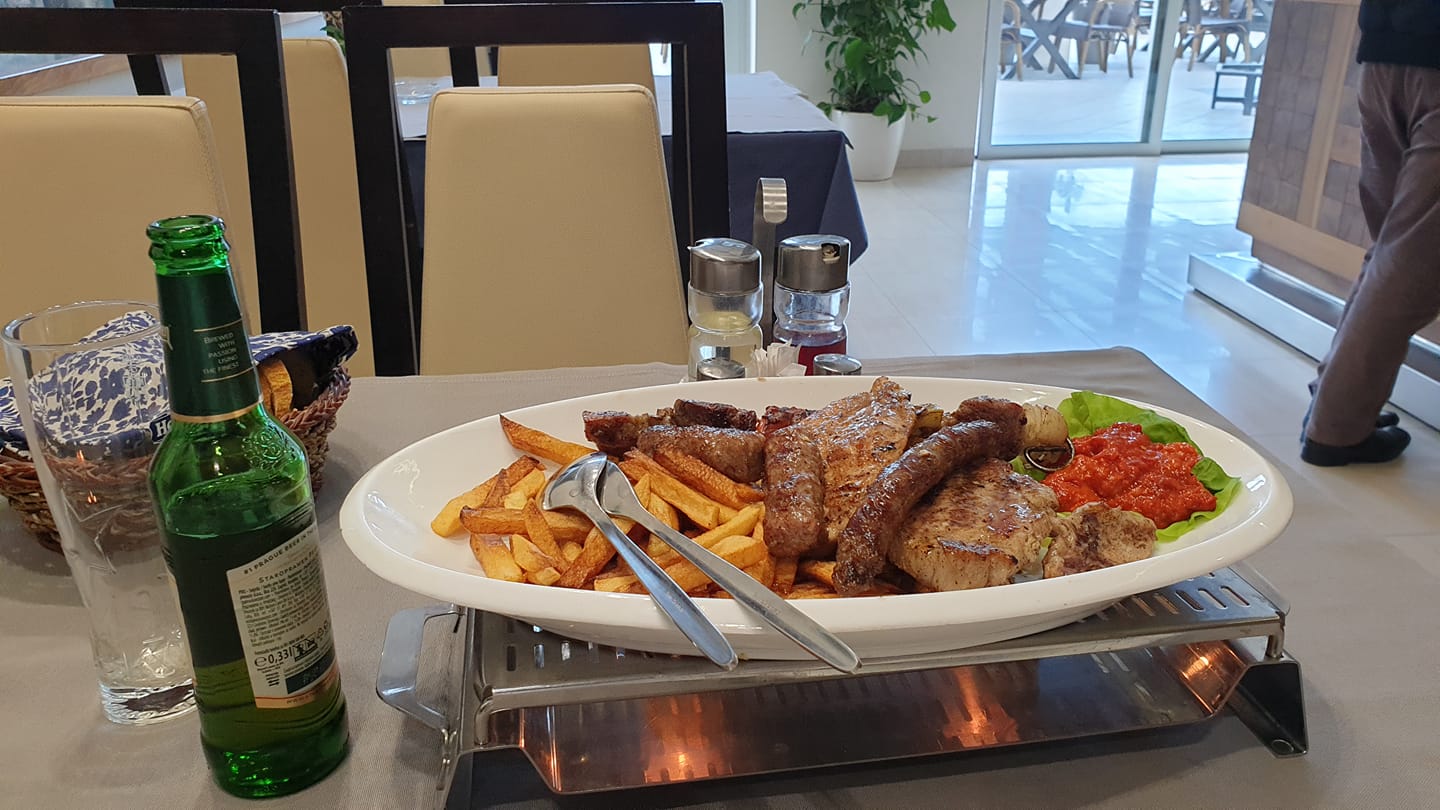
Having been mostly stuck on my sofa working online for the last couple of months, especially after living in a country whose cafes and restaurants have been shut for weeks, the prospect of a 12-hour drive from Varazdin to Tirana filled me with a little trepidation. Among the key worries was how easy it would be to cross the border, and whether or not the information I had found online had been correct. And if I did need a PCR test, where could I get one quickly in Dubrovnik?
As I sailed down the motorway, thoughts turned to food. Having become accustomed to living in a world without restaurants and bars, the charms of the motorway service station was my only option, but then I wondered if I had correctly remembered something about restaurants being open in Bosnia? I asked some friends what they could find. One replied that they were open only in the ski resorts, another that they were open everywhere. Again, finding concrete information in the Information Age...
Driving through the Neum Corridor which separates the two parts of Croatia until the Peljesac Bridge is finished, nothing more than a passport check and several questions about my destination. As I drove through Neum, I was wondering if my usual stopping point would be open and serving food. I was convinced it would not be, having been accustomed to a world without cafes and restaurants.
It was!
Even though it was far from the finest meal of my life, sitting in a restaurant with a mixed grill and a cold beer was one of the most exhilarating experiences in recent memory. The Old Normal.
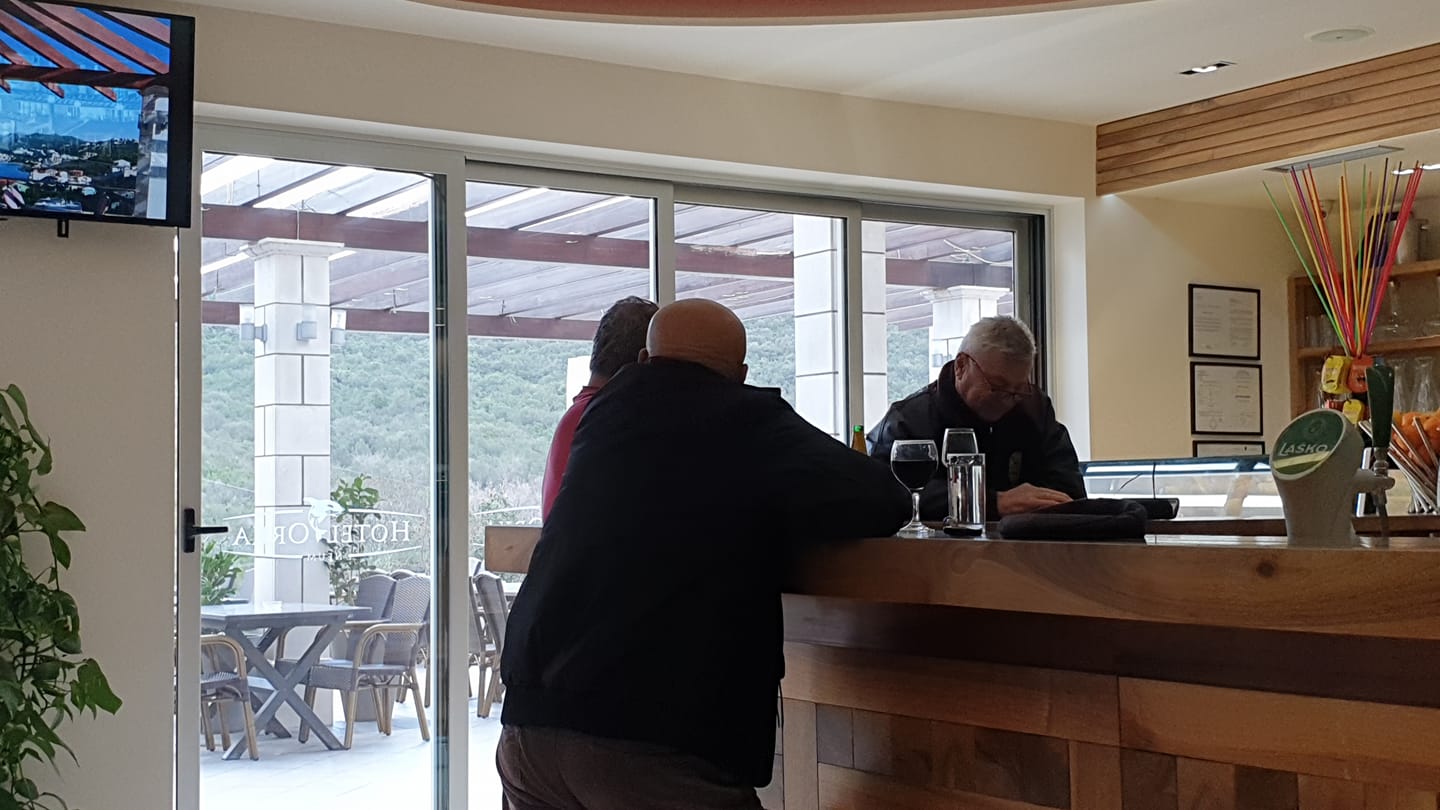
And I was only seconds into my old comfort zone before I encountered yet one more blast from the past - Balkan cafe philosophy. It has been a while since I had been privy to the pearls of wisdom that emanate daily from the cafes of the region, and it was good to have back in my life (I think...).
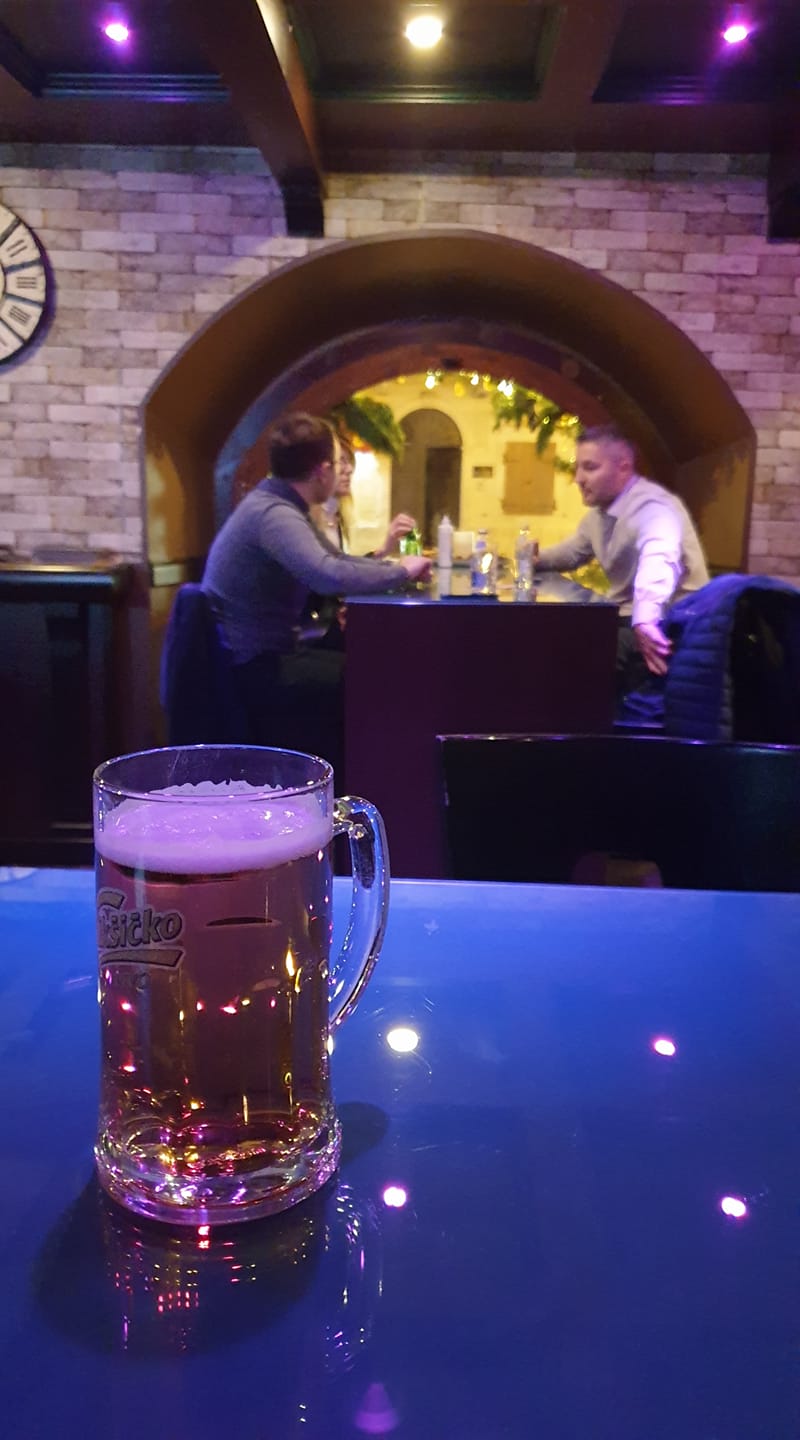
On to Montenegro and a first meeting, where my initial information was that only hotels could be open and serve, but then a secondary source said that all bars and restaurants could now work until 22:00, after which there was a nationwide curfew.
Once the border guard on the Croatian side was up to speed with the new rules, it was straight to Kotor old town and a meeting in a pub - just like life used to be. I can't tell you how nice it was to be back to how things used to be, or how people were observing distance in a way I don't see as much in Croatia. The evening curfew, which is also in effect in Bosnia and Albania, gets people back to their homes at night, so less house parties, while allowing businesses to operate, and for people to meet. From a psychological point of view, after weeks of closed bars and restaurants, it felt revolutionary. I am no expert in these things, but closed cafes and no curfew v open cafes and an evening curfew seems to have only one logical winner.
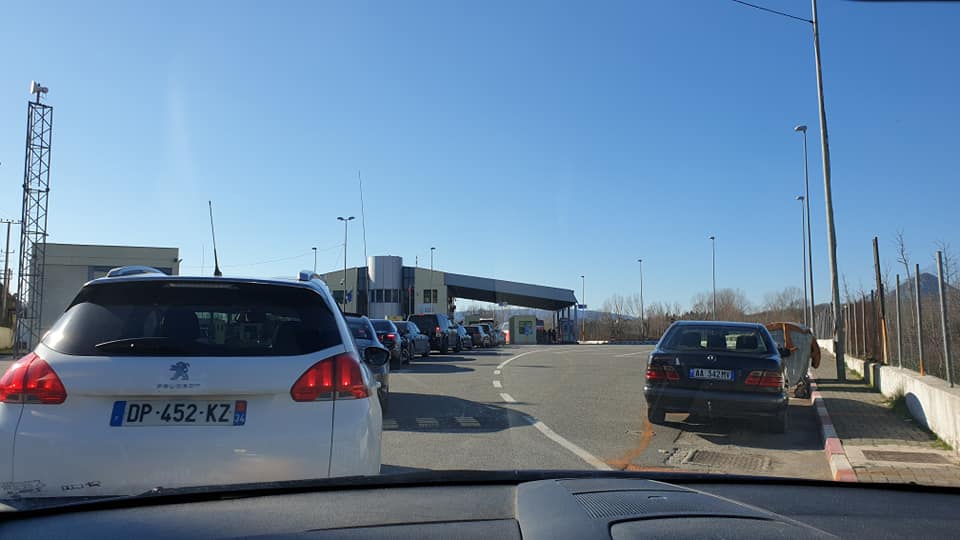
On to Albania. A 30-minute wait at the border, but a vehicle and passport check only.
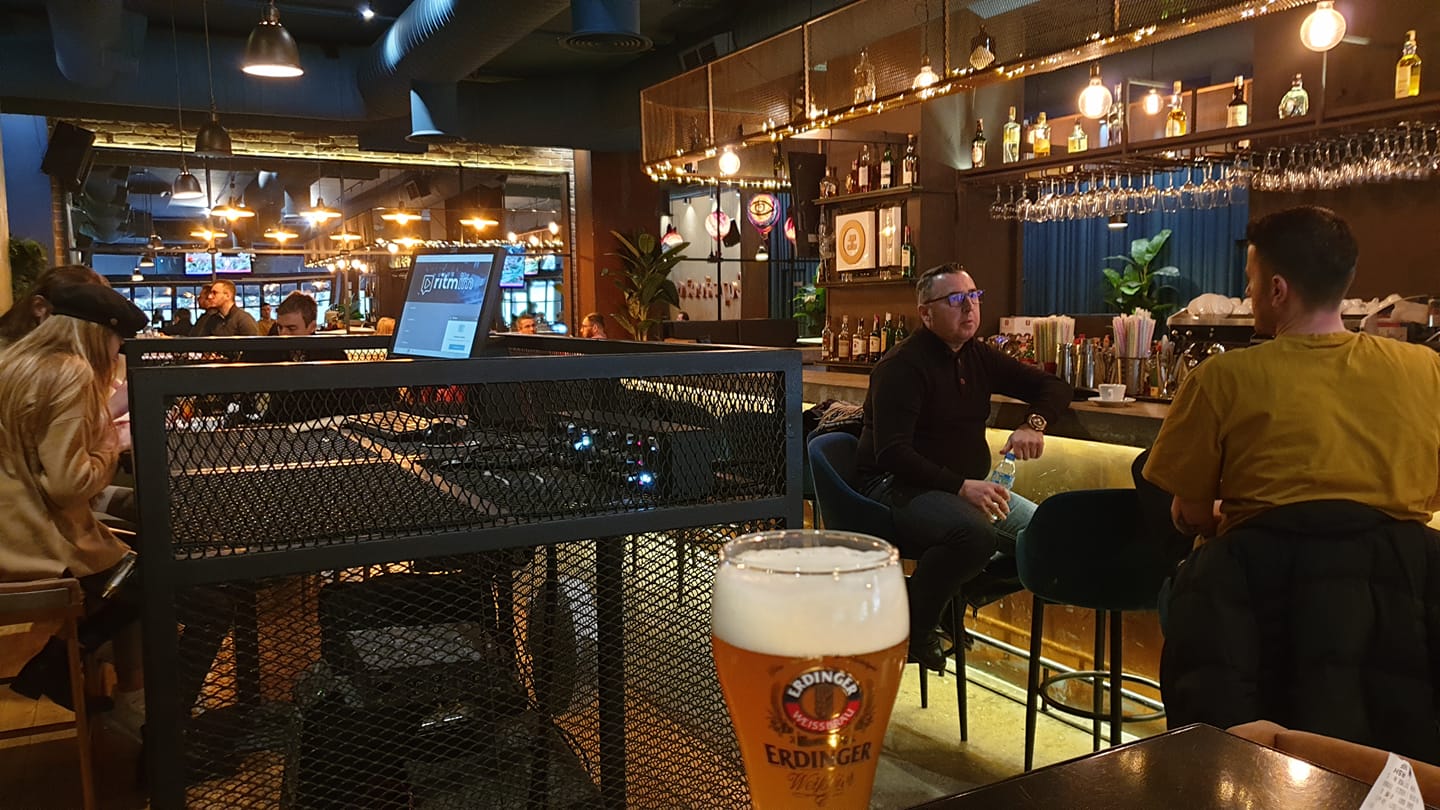
I spent the biggest part of my trip in Albania, and the longer I stayed, the more comfortable I was about a return to the old normal. More people wore masks in the streets than in the other countries, and the rules were more rigidly adhered to inside buildings. And it is interesting to note that Albanian corona deaths per capita are considerably less (more than 50% less) than their Balkan neighbours.
There is another aspect to this, especially in periods of prolonged lockdown - the psychological effects. Just having the option to go somewhere, even with restricted opening hours, makes a big difference mentally, as well, of course, as the economic effect for cafe and restaurant owners. It will be interesting to see what route Croatia chooses with the expected new measures on February 1.
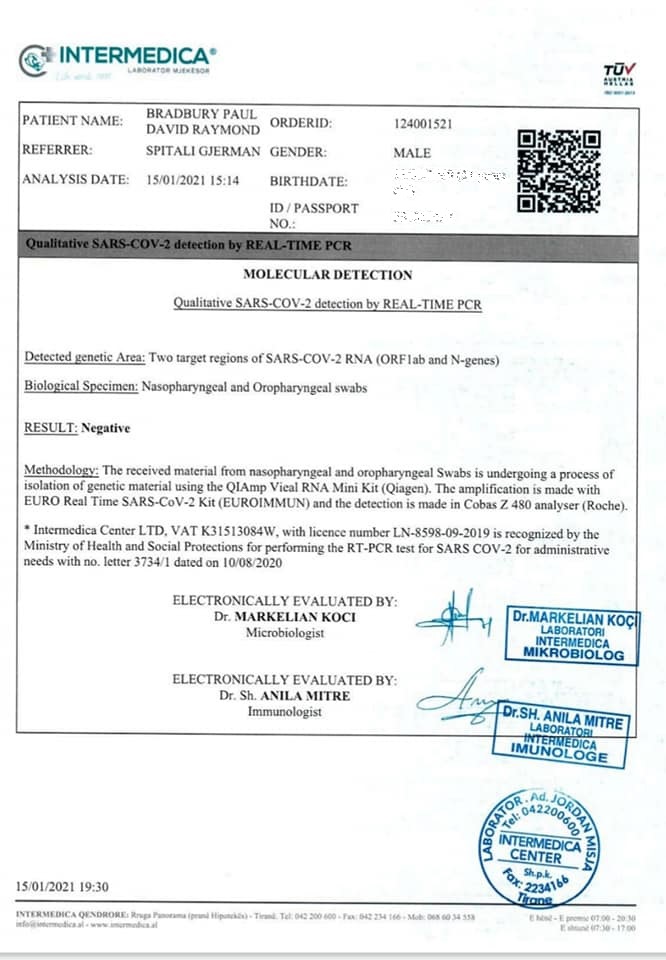
Yet more border rule changes from Croatia as I was out of the country, mostly affecting travellers from the UK. I knew that I needed a negative PCR test no older than 48 hours for re-entry, and finding a place that could deliver this in Tirana was the first thing I needed to sort on arrival. The German Hospital was the place to go. And for just 71 euro, I had the pleasure of a swab up both nostrils and the back of the throat, with the negative results sent by email and WhatApp less than three hours later. Very efficient.
The most challenging border on my return would be entering Croatia and showing the PCR test, but that was also very efficient. I showed the email from the hospital and was given a piece of paper with instructions and an email address to forward the test (the Croatian border police). And once it was sent, I was on my way.

Next destination, the island of Hvar and ferry to Sucuraj, but where to stop for a late lunch on the way? With everything closed in Croatia, the only option was Neum once more, which provided me enough sustenance for the final leg of the journey.
But the view from Neum shows how this region is changing, and the Neum Corridor will be much less busy when the Peljesac Bridge finally opens (in, from memory, 2022).
Let's hope Croatia will have opened its bars and restaurants by then.
For the latest travel info, bookmark our main travel info article, which is updated daily.
Read the Croatian Travel Update in your language - now available in 24 languages.
Join the Total Croatia Travel INFO Viber community.
New Official Croatian Border Crossing Rules, Recommendations (January 16, 2021)
January 17, 2021 - The official Koronavirus.hr website has updated the latest Croatian border crossing rules and regulations.
On 13th of January 2021, the Civil Protection Headquarters of the Republic of Croatia issued a Decision temporarily prohibiting and restricting the crossing of persons across all border crossing points of the Republic of Croatia (NN 3/21). However, in accordance with the guidelines of the competent authorities, exceptions have been made as follows:
Passengers travelling to the Republic of Croatia from an EU / EEA member state (regardless of their citizenship)
Passengers coming directly from the countries and / or regions of the European Union, i.e. countries and / or regions which are Member States of the Schengen Area and Schengen Associated Countries, and which are currently in the so‑called green list of the European Centre for Disease Prevention and Control, regardless of their citizenship, will be allowed entry into the Republic of Croatia under the same conditions as before the onset of the COVID-19 disease (they do not need to present a negative PCR test result for SARS-CoV-2 nor are they assigned the measure of self-isolation) if they show no signs of disease and they have not been in close contact with an infected person.
If the aforementioned persons transited to the border crossing points of the Republic of Croatia through other countries / regions without delay, they should prove at the border crossing point that they did not stay in transit areas and in that case, they will not be required to have a negative PCR test result for SARS-CoV-2 not older than 48 hours, nor stay in self-isolation.
Graphic representation of countries by color according to the risk of the COVID-19 disease can be found on the website of the European Centre for Disease Prevention and Control (ECDC)
All other passengers who, regardless of their citizenship, come to the Republic of Croatia from EU / EEA member states / regions, and which are currently not on the so-called green list of the European Centre for Disease Prevention and Control, must present a negative PCR test result for SARS-CoV-2 that is not older than 48 hours (counting from the time of taking the swab to arriving at the border crossing point) or have the PCR test for SARS-CoV-2 done immediately upon arrival in the Republic of Croatia (at their own expense), with the obligation of self-isolation until they receive a negative test result. In the case of impossibility of testing, a measure of self-isolation is determined for a period of ten (10) days.
Exceptionally, the PCR test for SARS-CoV-2 is not obligatory for the following categories of passengers traveling from EU / EEA member states / regions although they come from countries that do not belong to the green list of the European Center for Disease Control and Prevention:
- workers or self-employed persons performing essential tasks, including healthcare workers, frontier and posted workers and seasonal workers as specified in the Guidelines concerning the exercise of the free movement of workers during COVID-19 outbreak, provided they do not stay in the Republic of Croatia or outside the Republic of Croatia for longer than 12 hours;
- pupils, students and interns who travel abroad every day, provided that they do not stay in the Republic of Croatia or outside the Republic of Croatia for longer than 12 hours;
- seafarers and workers in the transport sector or transport service providers, including heavy goods vehicle drivers transporting goods to be used in the national territory and those who only transit;
- diplomats, staff of international organizations and persons invited by international organizations whose physical presence is necessary for the functioning of those organizations, military personnel and police officers, as well as humanitarian and civil protection personnel in the performance of their duties;
- persons traveling for necessary family or business reasons, including journalists in the performance of their duties;
- passengers in transit with the obligation to leave the Republic of Croatia within 12 hours from entry;
- patients traveling for urgent health reasons.
The provisions regarding frontier workers apply adequately to other categories of passengers who, due to the nature of their job or occupation, need to cross the state border frequently (e.g. athletes playing for clubs in a neighboring country).
Citizens of EU / EEA member states as well as members of their families traveling to the Republic of Croatia from third countries, i.e. those that are not members of the EU / EEA
Citizens of EU Member States (including Croatian citizens), i.e. of Schengen Member States and Schengen Associated States, as well as members of their families and third-country nationals who are long-term residents under Council Directive 2003/109/EC of 25 November 2003 concerning the status of third-country nationals who are long-term residents and persons entitled to reside under other EU directives or national law or who have national long-term visas coming from third countries, upon entering the Republic of Croatia must present a negative PCR test result for SARS-CoV-2 that is not older than 48 hours regardless of their citizenship (counting from the time of taking the swab to arriving at the border crossing point) or have the PCR test for SARS-CoV-2 done immediately upon arrival in the Republic of Croatia (at their own expense), with the obligation of self-isolation until they receive a negative test result. In the case of impossibility of testing, a measure of self-isolation is determined for a period of ten (10) days.
Exceptionally, for the abovementioned persons, a negative PCR test result for SARS-CoV-2 not older than 48 hours will not be obligatory at the border crossing point for healthcare workers, health researchers and caregivers for the elderly, frontier workers, workers in the transport sector, diplomats, staff of international organizations and persons invited by international organizations whose physical presence is necessary for the good functioning of those organizations, military personnel and police officers, as well as humanitarian and civil protection personnel in the performance of their duties, passengers in transit with the obligation to leave the Republic of Croatia within 12 hours from entry and persons travelling for schooling purposes, as well as persons who travel for urgent personal / family reasons, business reasons or have some other economic interest, and do not stay in or out of the Republic of Croatia for more than 12 hours.
Third-country nationals not covered by the abovementioned points
Third-country nationals not covered by the abovementioned points may enter the Republic of Croatia from third countries, and on that occasion, they do not need to present a negative PCR test result nor a self-isolation measure will be assigned to them, only if they are:
- healthcare workers, health researchers and caregivers for the elderly;
- frontier workers (as well as e.g. athletes as stated in the exceptions for passengers within the EU / EEA);
- workers in the transport sector;
- diplomats, staff of international organizations and persons invited by international organizations whose physical presence is necessary for the good functioning of those organizations, military personnel and police officers, as well as humanitarian and civil protection personnel in the performance of their duties;
- passengers in transit with the obligation to leave the Republic of Croatia within 12 hours from entry;
- persons travelling for schooling purposes;
- seafarers (if they intend to stay in the Republic of Croatia for more than 12 hours, entry into the Republic of Croatia will be provided upon presentation of a negative PCR test on SARS-CoV-2 not older than 48 hours or by PCR testing on SARS-CoV-2 immediately upon arriving to the Republic of Croatia and by self-isolating until they receive a negative test result);
- persons travelling for urgent personal / family reasons, business reasons or other economic interest (if they intend to stay in the Republic of Croatia for more than 12 hours, entry into the Republic of Croatia will be provided upon presentation of a negative PCR test on SARS-CoV-2 not older than 48 hours or by PCR testing on SARS-CoV-2 immediately upon arriving to the Republic of Croatia and by self-isolating until they receive a negative test result).
Passengers covered by Annex I to Council Recommendation (EU) 2020/912 on the temporary restriction on non-essential travel into the EU and the possible lifting of such restriction
Passengers (regardless of their citizenship) coming directly from countries covered by Annex I to Council Recommendation (EU) 2020/2169 of 17 December 2020 amending Recommendation (EU) 2020/912 on the temporary restriction on non-essential travel into the EU and the possible lifting of such restriction do not have to present a negative test result for SARS-CoV-2 nor are they subject to self-isolation if they have not been in close contact with an infected person and show no signs of disease. During their stay in the Republic of Croatia, they are obliged to adhere to the general and special recommendations and instructions of the Croatian Institute of Public Health.
At the border crossing point, the aforementioned persons, who transited to the border crossing points of the Republic of Croatia through other countries / regions without delay, should prove that they did not stay in transit areas and in that case, they will not be required to have a negative PCR test result for SARS-CoV-2 not older than 48 hours nor stay in self-isolation.When entering the Republic of Croatia, nationals of third countries covered by the list of countries of the Croatian Institute for Public Health to whom special epidemiological measures are applied (available here) must present a negative PCR test result not older than 48 hours and they are obliged to stay in self-isolation for 14 days, which could be shortened if a person takes a PCR test for SARS-CoV-2 at their own expense on the seventh day of self-isolation at the earliest at an institution authorized to perform PCR testing and the result is negative.
Persons travelling to the Republic of Croatia for humanitarian reasons related to providing assistance to the areas affected by the earthquake
Persons travelling to the Republic of Croatia for humanitarian reasons related to providing assistance to the areas affected by the earthquake (Sisak-Moslavina County, Karlovac County and Zagreb County), regardless of their citizenship and the area from which they arrive, are allowed to enter the Republic of Croatia based on the previous consent of the Civil Protection Headquarters of the Republic of Croatia.
These persons present an exception and will be allowed to enter the Republic of Croatia without the need to present a negative PCR test result on SARS-CoV-2, nor will they be obliged to self-isolate upon entering the Republic of Croatia.
In order to shorten the procedure at the border crossing point, we advise all foreign passengers, regardless of their citizenship, to fill the announcement in advance at Enter Croatia.
General note: if the passenger’s validity of the PCR test for SARS-CoV-2 of 48 hours expired during the border control at the entrance to the Republic of Croatia or they do not have the PCR test at all and they meet other conditions of entry, they will be allowed to enter the Republic of Croatia, provided that they immediately get tested in the Republic of Croatia at their own expense, with the obligation to stay in self-isolation until they receive a negative test result.
Lifting the measure of self-isolation (imposed on the border crossing point) after the receipt of a negative PCR test result:
In such cases, passengers will receive a leaflet at the border crossing point with instructions on the actions to be taken after they receive a negative molecular PCR test result (rapid antigen tests or serological tests will not be accepted).
The leaflet will include an e-mail address of the border crossing point where the passenger was imposed the measure of self-isolation, to which he/she can send the negative test result obtained from the medical facility where the test was taken, so that the imposed measure can be lifted (removed).
These persons are obligated to take the test at the place of their temporary or permanent residence, where they have all of the necessary conditions for self-isolation until their negative PCR test result arrives.
Persons who have recovered from COVID-19 within the past three months are exempt from the obligation to provide a negative PCR test result and to self-isolate.
In order to prove their recovery, passengers need to have a positive PCR test result or antigen test result, or a positive neutralization test (NT) result obtained within the last three months and older than 14 days, or a certificate of recovery issued by a doctor.
Persons who have a negative PCR test result made in the Republic of Croatia due to a short trip to our neighboring or another country and return to the Republic of Croatia within less than 48 hours from the day of testing, i.e. within the period of test validity, will not be required to present a new PCR test from the country in which they have been staying for a short time, but will be allowed to enter upon presenting the test made in the Republic of Croatia.
When staying in the Republic of Croatia, all passengers, regardless of their category and country from which they came, are obliged to follow the general and special instructions and recommendations of the Croatian Institute of Public Health.
For the latest news regarding coronavirus in Croatia, follow the dedicated TCN section.
Alemka Markotic Discusses Vaccine, Virus, Measures and Earthquake
January the 17th, 2021 - Dr Alemka Markotic, the director of Zagreb's "Dr Fran Mihaljevic'' Clinic for Infectious Diseases discussed the arrival of the coronavirus vaccine, the virus itself, the current anti-epidemic measures and the effect the earthquake has had on the spread of the contagion in a recent interview for Croatian Radio.
As Poslovni Dnevnik writes, Alemka Markotic discussed how the novel coronavirus has succeeded in spread around the world in the past year, she also spoke about the epidemiological situation in Sisak-Moslavina County after the earthquake, how vaccination is proceeding, the various new virus strains and the current epidemiological measures in place.
Alemka Markotic pointed out that the number of new coronavirus patients is falling across Croatia and that this means a lot for patients who do unfortunately require medical care when they become infected because they can now be offered better care. She noted that the negative trend is also excellent for healthcare professionals who were previously under great pressure. She added that we're still deep in the colder winter months and that this is the sort of weather which goes hand in hand with the spread of diseases which can be transmitted via droplets from sneezing, coughing and the like.
She stressed that there are many factors that affect the spread of the virus, but also that certain changes do normally occur in it as well. The population of certain areas and the age of people exposed to various infections are also important to take into account.
''On the other hand, we're witnessing that while the situation is very difficult, no one is questioning the measures. As soon as it is seen that the situation is easing and the number of infected and the number of deaths is falling, both the measures and those who put the measures in place are immediately questioned. We've seen in other countries that have allowed themselves a little more relaxation that the situation has become bad again, with the penetration of the virus spreading rapidly,'' she said.
''There are certain professions, activities, which are unfortunately more affected by this lockdown of sorts. Some of them managed to find an alternative to survive in some way, if nothing else, and sadly some failed to do that,'' stated Alemka Markotic, adding that there is nothing that has no price that comes with it.
''It's the same as when you take medicine, it will in most cases cure and protect you. But it can also have side effects, harmful effects, and even when you know that a particular drug has greater harmful effects, you'll take it because it will save your life, and you agree to the part where that drug will cause some unpleasant consequences for you, which may be permanent,'' she said.
When asked whether the whole of the month of February will continue to go on under anti-epidemic restrictions, Alemka Markotic said that the situation is constantly being monitored and the measures have not been set in stone. That the situation continues to be fluid.
''Everything that can be and tried to be gradually released, as was done back during that first wave, will surely be done in a similar way now. Only now we have an additional problem on our hands because there's a lot more in place. The virus has spread around the world in this one single year. Secondly, as we create obstacles for it, it finds new ways to get to us, genetically, it finds ways to spread faster. It’s a game between us and the virus that is carrying on,'' she said.
Croatia is not an island...
Speaking about the infection rate, Alemka Markotic said that Croatia was among the countries that didn't insist on the so-called traffic light system. She also mentioned that Croatia is not an island and that it is important what the situation is in Austria, Bosnia and Herzegovina, Slovenia, Serbia and other countries.
''It's also important what time of year it is, whether we'll have tourists or not, whether we'll go on trips or not, whether there are some holidays or festivities, whether there are any activities where people will be more mobile. It's mobility that is very conducive to the spread of the virus. These are the times where sometimes you try to be better, sometimes you succeed, and sometimes you're not 100% the best. There's no one who has been perfect in this past year. You saw that Croatia was among the best in the world for a while, and then for a short time, we were among the absolute worst. Most other countries experience the same thing. Unfortunately, there are those countries which are constantly very poor and those who do more or less okay due to some demographic and social characteristics,'' she explained.
Alemka Markotic understands that it is very difficult to live in uncertainty, and she emphasised that she is extremely optimistic that there is now a vaccine.
''It would be a shame to get the virus now, become seriously ill, and God forbid die, and the vaccine is already there, right at your fingertips. If this dynamic of vaccine delivery is fast enough, some kind of end to the pandemic can now be seen, which again depends on how many people will get the vaccination and how much they will accept it. On the other hand, we could just go ahead an promise that March the 1st will be the day when we lift all of the measures, and then situations happen that prevent that from happening and you just can’t fulfill that promise, I don't know what the greater torment is. They're both awful situations to live in - to wait and not see what the date will be, when you might be able to breathe a little and live easier. Or to have one promise and experience severe disappointment,'' said Alemka Markotic.
She reiterated that a lot of people cannot tolerate the current situation in the long run, that everyone has had enough of everything, but that we simply have to find a way to endure it for now.
Earthquake-affected areas
She also spoke about the epidemiological situation in Sisak-Moslavina County after the earthquake and reminded everyone that after the earthquake in Zagreb in March, not many people came to the capital from all parts of Croatia, as is the case with Banovina, where people from abroad have been coming to deliver aid.
''In the area of Sisak-Moslavina County, even before the earthquake, the number of infected people began to grow sharply. Then the earthquake occurred. A lot of people with the best intentions are coming to visit the area and are coming from all parts of Croatia on their own initiative to help. I think we'll see the consequences of that in the long run. But then again, the situation is different because we have the vaccine and rapid antigen tests, which we didn’t have at the time of the first earthquake in Zagreb last spring. I'm not so pessimistic about the situation, but I believe that some increased numbers could be seen there, as well as the spread of the virus in other environments from which people came,'' she pointed out.
How can we actually achieve collective immunity against the novel coronavirus? When asked whether collective immunity is a myth or a reality, Alemka Markotic said that it isn't a myth, but that the question is with what and how it can be achieved.
She mentioned the example of measles and said that it was also a droplet disease "which can be transmitted in a similar way as the novel coronavirus".
''For centuries now, a lot of people got sick and died until a vaccine came along. When collective immunity was achieved with the vaccine, only then were we able to curb measles. Influenza is transmitted in a similar way, but here we have a situation where the virus is changing. Its genome is composed of several parts, and such viruses are subject to more frequent changes. It changes and collective immunity is never achieved and won't ever be achieved by a lot of people contracting and then recovering from the flu. That's why we have vaccines and we monitor the virus and its changes so that we manage to produce a very adequate vaccine every time it changes. Where vaccination rates are high, we have an excellent level of protection. With the novel coronavirus, there are now two questions - how many people will be willing to get vaccinated, as we've seen it affects all groups of people, as well as the most fragile are the elderly with additional chronic diseases. Another thing is how its changes and its genome will affect those vaccines. Mutant strains of the virus have been recorded in Ireland, the United Kingdom, several in Greece, about 30 in France and Italy, and in Croatia we haven't yet confirmed its existence. Its spread is influenced by the mobility of people,'' Alemka Markotic pointed out.
For the latest travel info, bookmark our main travel info article, which is updated daily.
Read the Croatian Travel Update in your language - now available in 24 languages.
Health Professionals Who Work With COVID Patients to Receive Bonus
ZAGREB, 16 January, 2021 - All healthcare professionals who work with COVID-19 patients will receive a just bonus in line with the government's decision, the Health Ministry said on Saturday.
The ministry requested from all hospital directors a report on the implementation of the decision and Minister Vili Beroš said all must be justly paid for their work.
The ministry recalled that the government decided on 7 December that healthcare professionals who work with COVID-19 patients should receive a bonus amounting to 10% of the base pay.
The ministry also recalled that the base pay depended on the job complexity index and that this impacted the amount of said bonus.
Croatia Reports 763 New Coronavirus Cases, 38 Deaths
ZAGREB, 16 January, 2021 - Croatia has recorded 763 new coronavirus cases and 38 infection-related deaths in the last 24 hours.
Currently, there are 4,711 active cases in the country, including 1,760 infected people who are receiving hospital treatment and 154 of them are on ventilators, the national coronavirus response team said on Saturday.
Since 25 February 2020, when the first case was confirmed in the country, 224,575 people have been infected with the novel virus, of whom 4,588 have died and 215,276 have recovered, including 667 in the last 24 hours. Currently, 17,861 people are in self-isolation.
A total of 1,113,856 people have been tested to date, including 5,969 in the last 24 hours.
Istria County Believes They'll Be First in Croatia to Loosen Measures
January 16, 2021 - Istria could be the first in Croatia to loosen measures because it has the best epidemiological situation in the country, along with Dubrovnik-Neretva County.
The Chief of the Istria County Civil Protection Headquarters, Dino Kozlevac, announced that communication with the National Headquarters would begin next week about making adjustments. He did not state precisely what should return to normal first, but it will probably be gyms or sports activities.
"We will first restore activities that have an impact on fitness, life, and work—that first, and then gradually the rest. We are cautious because the situation in some neighboring countries is not good, and it is getting worse. We would not like to reduce the measures that would have to be returned very soon," Kozlevac told Nova TV.
Asked if the National Headquarters would agree to different measures in different regions, Kozlevac said he would 'find a common language.'
"I believe that regional specificity and results will be respected. It is not fair to wait for someone who still has work to do. Our citizens, who are most responsible for reducing the number of cases because they adhere to the measures, deserve to be the first to receive concessions," said Kozlevac.
He emphasized that Istria has good numbers, and the number of new cases has been declining for the fourth week.
On Friday, 249 swab samples were tested for COVID-19 at the Istria County Institute of Public Health. 13 newly infected persons from the county were confirmed.
Nine infections came from self-isolation measures or close contact with an already known positive person. One person is an imported case from the area: Italy (1).
Thirty people were cured. There are currently 229 active COVID-19 positive individuals in Istria County and 1109 people under self-isolation measures.
At the General Hospital in Pula, at the Department of Infectious Diseases, 51 people are being treated, of which five are in the respiratory center.
For the latest travel info, bookmark our main travel info article, which is updated daily.
Read the Croatian Travel Update in your language - now available in 24 languages.
Join the Total Croatia Travel INFO Viber community.
When Will Vaccination of Majority of Croatian Residents Begin?
January the 16th, 2021 - The vaccine is finally here and countries across the world are rolling out vaccinations en masse in an attempt to declare the end of the coronavirus pandemic. PM Andrej Plenkovic recently stated that the government had upped its vaccine order and that the plan was to vaccinate most of the population by the end of April. Speaking practically, however, when will the majority of Croatian residents be vaccinated?
As Poslovni Dnevnik writes, the head of the branch office of the Institute of Public Health on the island of Krk, Dr. Lovorka Nemec Strcic said as a guest on the show "Studio 4" that the plan of the Institute of Public Health on the island of Krk is to start vaccinating citizens over 65 and those who have underlying conditions/are chronically ill in the middle of next week.
"We'd start next week with a smaller number of people, and it all depends on how many doses of the vaccine will be made available to us," she said. She emphasised that the dynamics of further vaccination of Croatian residents will also depend on the amount of vaccines which arrive. Nemec Strcic pointed out that the implementation of vaccination was planned in the Northern Adriatic city of Rijeka, at as many as three different points, and in other parts of the county there would be branches of the Teaching Institute doing so.
The President of the Coordination of Croatian Family Medicine, dr. med. Natasa Ban Toskic said that until yesterday morning, no doctor had received an official notification as to when the vaccination of Croatian residents would start, nor has the amount of vaccine doses and at what rate the population would be vaccinated been explained.
"Organisationally speaking, we don't really know anything yet," said Dr. Natasa Ban Toskic, adding that although family doctors have long been appointed as the most important vaccination providers, they are not communicated with as partners, but they instead receive most of their information through the media or in the form of orders or short e-mails on a day to day basis. She added that there is no real cooperation to speak of in this regard.
Lovorka Nemec Strcic said that the cooperation of her Institute with family doctors does exist, but when it comes to the general vaccination process of Croatian residents, nothing has been defined as yet. She added that it will most likely be epidemiologists doing the vaccinating at the beginning, and only in Rijeka. Vaccination will not be possible in other parts of the county next week. Nemec Strcic said that Croatian residents will be vaccinated with those vaccines that the Institute of Public Health of the island of Krk will have, and that the organisation of the vaccination itself is demanding.
Ban Toskic added that the Coordination of Croatian Family Medicine had sent out a letter to all relevant institutions back in November, in which they pointed out the problems that could occur, adding their own proposals in order to try to make things easier.
For the latest travel info, bookmark our main travel info article, which is updated daily.
Read the Croatian Travel Update in your language - now available in 24 languages.


